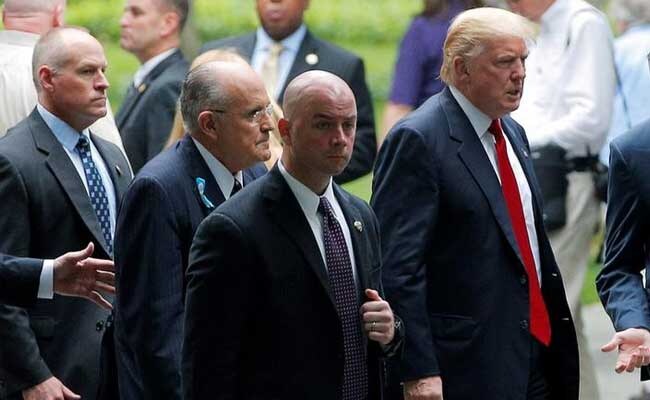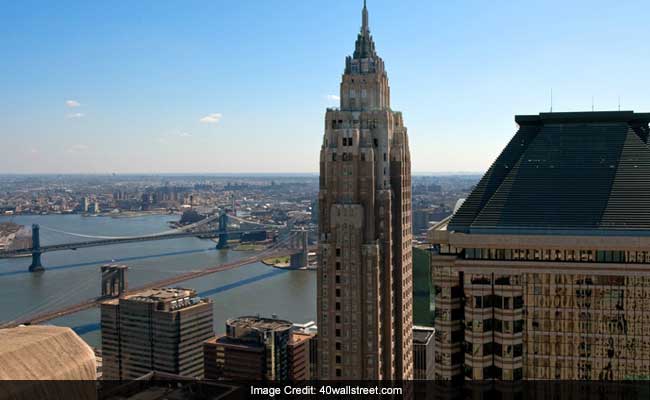
U.S. Republican presidential candidate Donald Trump (R) arrives at the National 9/11 Memorial in New York
In the years following the 9/11 terrorist attacks, Donald Trump worried that he might not be able to rent space in his skyscrapers.
"When you see pictures of people on fire jumping off the building when the World Trade Center was hit, you think: 'This may be hard to rent,'" Trump said in a May 11, 2005, interview with journalist Timothy O'Brien that was included in the book "TrumpNation: The Art of Being Donald Trump."
At the time of the interview, Trump was trying to build the tallest skyscraper in Chicago but facing resistance from people who "don't get it." He was also frustrated that Midwesterners wouldn't let him exaggerate the floor count as he had been able to do in New York, O'Brien wrote.
Trump frequently invokes 9/11 on the campaign trail, especially in defense of his proposal to temporarily ban the entry of Muslims and others from countries "compromised" by terrorism. During the Republican primary, Sen. Ted Cruz, Texas, attacked Trump's "New York values" during a debate, and Trump responded with an emotional remembrance of the terrorist attacks on his city.
But in the hours and years after the attacks, Trump was also worried about business. Trump's campaign did not respond to a request for comment.
On Sept. 11, 2001, Trump called a New York television station to share what he had seen from his skyscraper apartment and what he had heard from associates closer to the World Trade Center. At one point during the nearly 10-minute interview, Trump mentioned that his building in the Financial District was now the tallest.
 "Forty Wall St. actually was the second-tallest building in downtown Manhattan, and it was, actually, before the World Trade Center, was the tallest," Trump said in an interview with WWOR-TV in New York when asked whether the building had been damaged. "And then when they built the World Trade Center, it became known as the second-tallest, and now it's the tallest."
"Forty Wall St. actually was the second-tallest building in downtown Manhattan, and it was, actually, before the World Trade Center, was the tallest," Trump said in an interview with WWOR-TV in New York when asked whether the building had been damaged. "And then when they built the World Trade Center, it became known as the second-tallest, and now it's the tallest."
Later, Trump applied for and received a $150,000 federal grant given to businesses near the World Trade Center that were negatively affected by the attacks. Amid criticism about accepting that grant money this spring, Trump and his wife visited the National September 11 Memorial Museum for the first time in April, and Trump's foundation - which gets most of its funding from donors other than Trump - made a $100,000 donation to the museum.
Several of Trump's statements about what he witnessed that day appear to be greatly exaggerated or false. Trump has said that he watched from his apartment in Trump Tower on Fifth Avenue as the second plane hit the World Trade Center and that he saw people jump to their deaths, even though the twin towers were more than four miles away. Trump has said that he went to Ground Zero to watch the clearing of the rubble and that he "helped a little bit," a claim others have challenged. Trump has said that he witnessed "thousands and thousands" of Muslims in New Jersey publicly celebrating the attacks, a story that has been widely debunked.
© 2016 The Washington Post
(This story has not been edited by NDTV staff and is auto-generated from a syndicated feed.)
"When you see pictures of people on fire jumping off the building when the World Trade Center was hit, you think: 'This may be hard to rent,'" Trump said in a May 11, 2005, interview with journalist Timothy O'Brien that was included in the book "TrumpNation: The Art of Being Donald Trump."
At the time of the interview, Trump was trying to build the tallest skyscraper in Chicago but facing resistance from people who "don't get it." He was also frustrated that Midwesterners wouldn't let him exaggerate the floor count as he had been able to do in New York, O'Brien wrote.
Trump frequently invokes 9/11 on the campaign trail, especially in defense of his proposal to temporarily ban the entry of Muslims and others from countries "compromised" by terrorism. During the Republican primary, Sen. Ted Cruz, Texas, attacked Trump's "New York values" during a debate, and Trump responded with an emotional remembrance of the terrorist attacks on his city.
But in the hours and years after the attacks, Trump was also worried about business. Trump's campaign did not respond to a request for comment.
On Sept. 11, 2001, Trump called a New York television station to share what he had seen from his skyscraper apartment and what he had heard from associates closer to the World Trade Center. At one point during the nearly 10-minute interview, Trump mentioned that his building in the Financial District was now the tallest.

40 Wall Street - The Trump Building, is a 71-story skyscraper in New York City
Later, Trump applied for and received a $150,000 federal grant given to businesses near the World Trade Center that were negatively affected by the attacks. Amid criticism about accepting that grant money this spring, Trump and his wife visited the National September 11 Memorial Museum for the first time in April, and Trump's foundation - which gets most of its funding from donors other than Trump - made a $100,000 donation to the museum.
Several of Trump's statements about what he witnessed that day appear to be greatly exaggerated or false. Trump has said that he watched from his apartment in Trump Tower on Fifth Avenue as the second plane hit the World Trade Center and that he saw people jump to their deaths, even though the twin towers were more than four miles away. Trump has said that he went to Ground Zero to watch the clearing of the rubble and that he "helped a little bit," a claim others have challenged. Trump has said that he witnessed "thousands and thousands" of Muslims in New Jersey publicly celebrating the attacks, a story that has been widely debunked.
© 2016 The Washington Post
(This story has not been edited by NDTV staff and is auto-generated from a syndicated feed.)
Track Latest News Live on NDTV.com and get news updates from India and around the world

